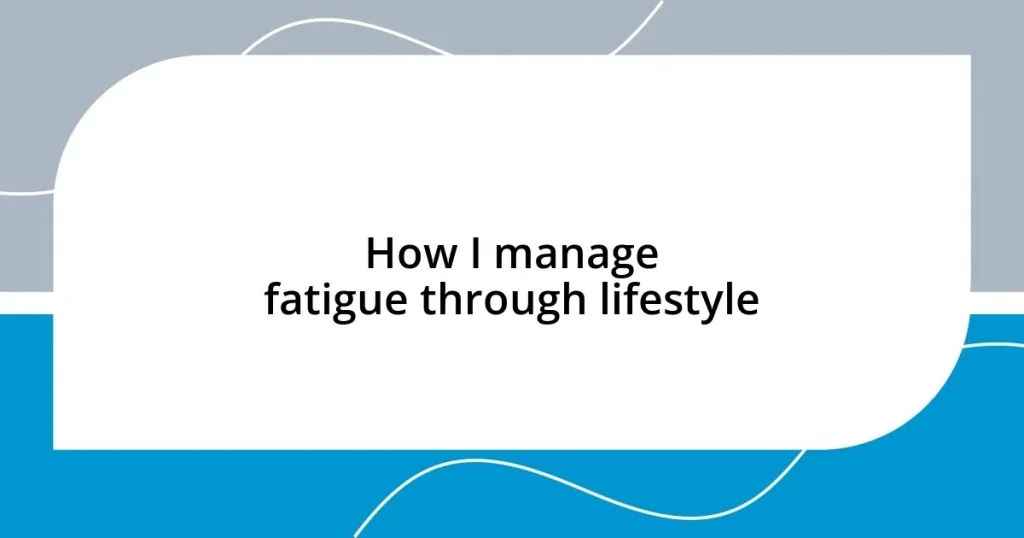Key takeaways:
- Fatigue management involves recognizing triggers and making mindful lifestyle changes, such as improving sleep and dietary habits.
- Quality sleep is crucial for energy; factors like consistency and a calming bedtime routine significantly enhance sleep quality.
- Regular physical activity and stress management techniques, like deep breathing and setting boundaries, are vital for maintaining energy levels.
- Staying hydrated is essential, as even mild dehydration can lead to fatigue; incorporating healthy fluid choices can improve overall well-being.
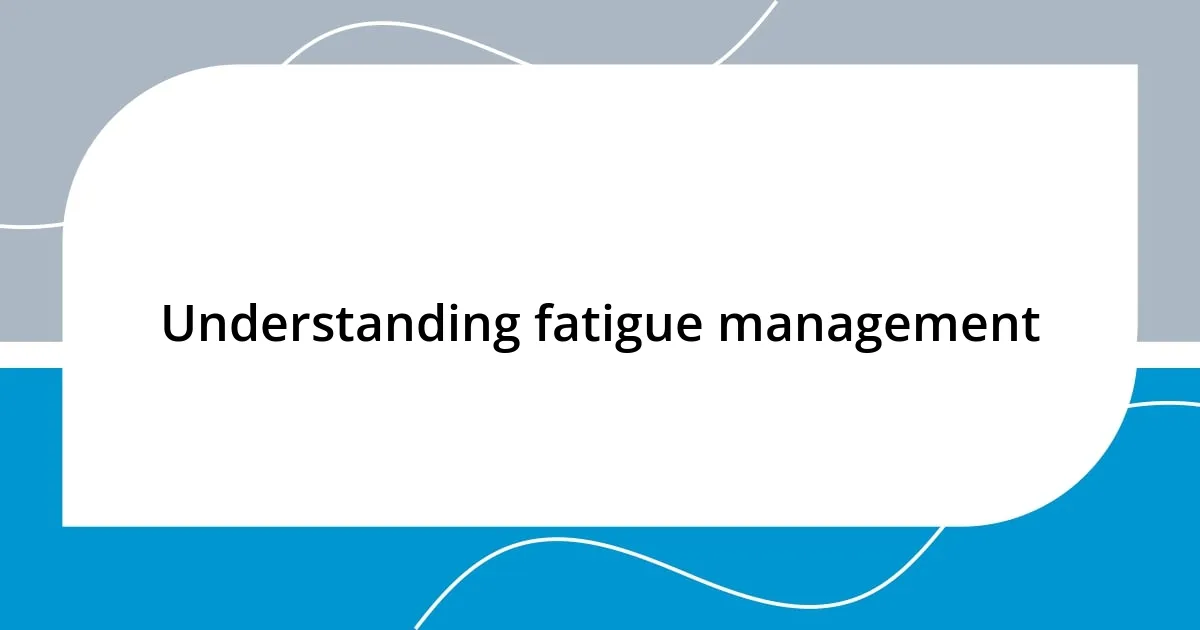
Understanding fatigue management
Fatigue isn’t just about feeling sleepy; it can be a complex blend of physical, emotional, and situational factors. There have been times in my life when I pushed through exhaustion, believing I could outsmart it with sheer willpower. Looking back, I realize that this struggle only deepened my fatigue instead of alleviating it.
Understanding fatigue management means recognizing the triggers that sap my energy. For instance, I once lived through a week of irregular sleep due to work commitments, and the fog that clouded my thoughts was suffocating. Have you ever noticed how a single night of poor sleep can throw off your entire week? It’s fascinating—our bodies crave consistency, and when we disrupt that routine, we pay a heavy price.
I’ve learned that incorporating small, manageable changes can significantly influence how I feel daily. For example, taking short walks during breaks not only renewed my energy but also lifted my mood. Imagine feeling that surge of vitality after just a few minutes outdoors—it’s a game changer! Understanding fatigue management isn’t just about tackling tiredness; it’s about nurturing ourselves through mindful choices and support.
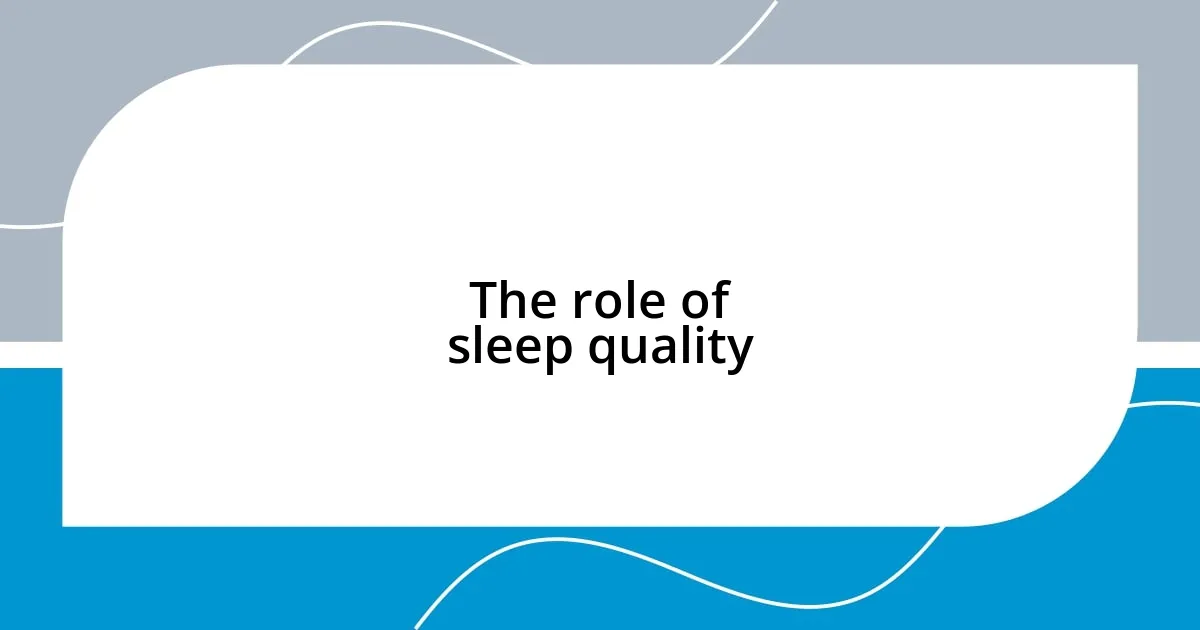
The role of sleep quality
When I talk about sleep quality, I can’t help but reflect on how transformative my sleep journey has been. A few years ago, I struggled with a chaotic sleep schedule, often sacrificing rest for late-night work. Engaging in that routine felt productive at the time, but it didn’t take long for me to realize that my waking hours were filled with irritability and a lack of focus. It was eye-opening to discover that deep, restorative sleep is not just about quantity but also quality. I now prioritize creating a soothing bedtime routine, and the difference it makes is remarkable.
Here are a few crucial factors that contribute to sleep quality:
- Consistency: Going to bed and waking up at the same time helps regulate my body’s internal clock.
- Environment: I’ve invested in blackout curtains and a white noise machine to create an optimal sleep setting.
- Pre-sleep rituals: Engaging in calming activities like reading or gentle stretching signals my brain that it’s time to wind down.
- Screen time: Limiting exposure to screens an hour before bed has significantly improved my sleep.
- Diet: Avoiding heavy meals or caffeine close to bedtime ensures that my body isn’t working overtime while I’m trying to rest.
Recognizing these elements has been a revelation. I feel more energized and emotionally balanced, proving to me that quality sleep is a vital component of managing my fatigue effectively.
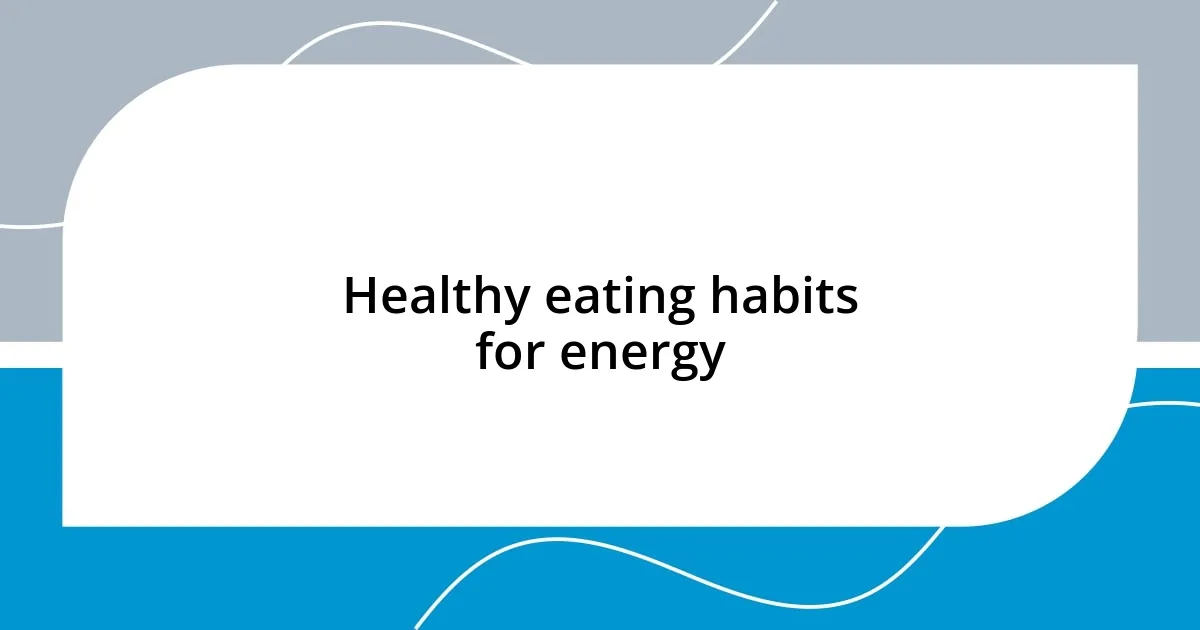
Healthy eating habits for energy
When I think about healthy eating habits, I realize how crucial they are for maintaining my energy levels throughout the day. I used to skip breakfast, thinking it would help me get ahead, but I quickly learned that it only led to fatigue by mid-morning. Now, I make it a priority to start my day with a balanced meal—usually something like oatmeal with fruits. Nutrition isn’t just fuel; it’s like filling up my emotional tank.
Incorporating snacks into my routine has also been a game changer. I discovered that munching on nuts or yogurt in between meals helps stabilize my blood sugar, giving me a much-needed boost during those midday slumps. Have you ever felt the afternoon drag? It can be a challenge, but I find that these small dietary adjustments help maintain a steady flow of energy. Instead of reaching for sugary snacks that offer a quick high followed by a crash, I opt for something wholesome that keeps me going.
I’ve also become more mindful of hydration. I remember a day when I felt utterly drained, only to realize later that I hadn’t had enough water. Now, I carry a reusable water bottle filled throughout the day. Staying hydrated might seem simple, but it makes a huge difference in how I feel. Each of these healthy eating habits isn’t just about nutrition; they’re part of a holistic approach to reclaim my energy, turning what once felt like a struggle into a manageable and enjoyable process.
| Healthy Eating Habit | Benefit |
|---|---|
| Balanced Breakfast | Provides sustained energy and helps prevent mid-morning fatigue |
| Healthy Snacks | Keeps blood sugar levels stable and prevents energy crashes |
| Hydration | Enhances overall energy and cognitive function |
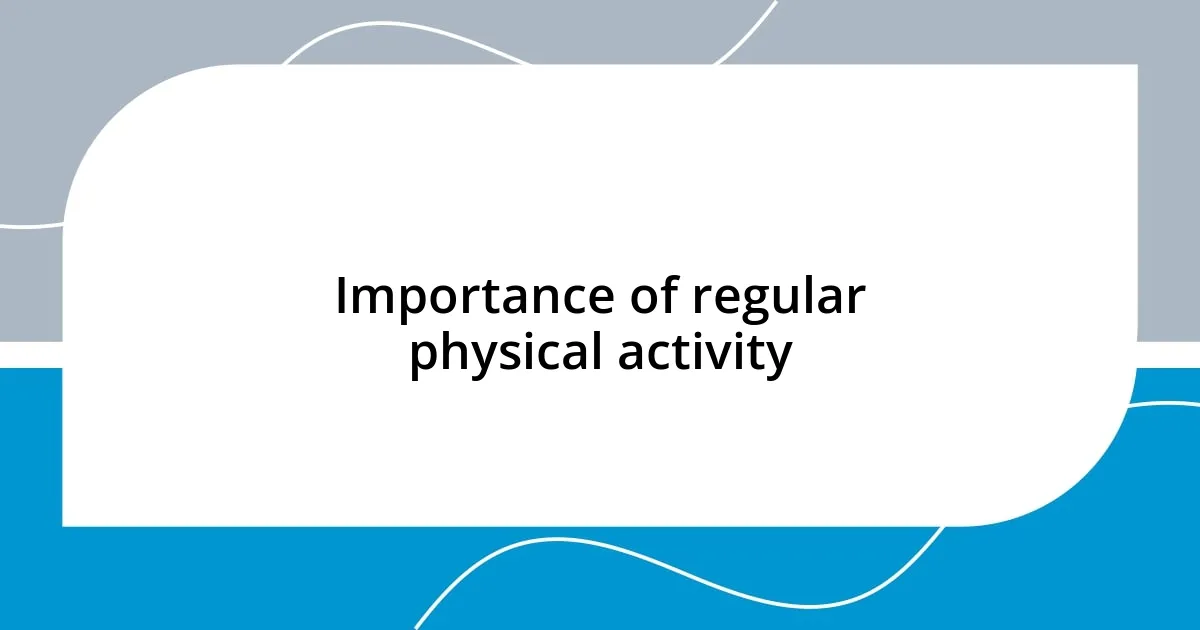
Importance of regular physical activity
Regular physical activity has been a cornerstone of my energy management strategy. Initially, I viewed exercise as an obligation rather than an opportunity. That changed when I realized that a simple 30-minute walk could uplift my mood significantly. It’s fascinating how movement can become a natural reset button, isn’t it?
I remember a particularly exhausting week when the idea of hitting the gym felt overwhelming. Instead, I opted for a casual bike ride around my neighborhood. To my surprise, not only did my fatigue lessen, but I also felt more mentally clear. It’s incredible how the endorphins released during exercise can transform my perspective in a matter of moments. Have you experienced that rush of energy after a workout? It’s like a light switch turning on inside me.
Adding variety to my routine, like practicing yoga or going for hikes, has not only kept things enjoyable but has also helped me avoid the burnout that comes from monotony. I often reflect on how much better I feel after a good stretch or a day outdoors. Every bit of movement counts, and I cherish those moments for their profound impact on my energy levels and overall well-being.
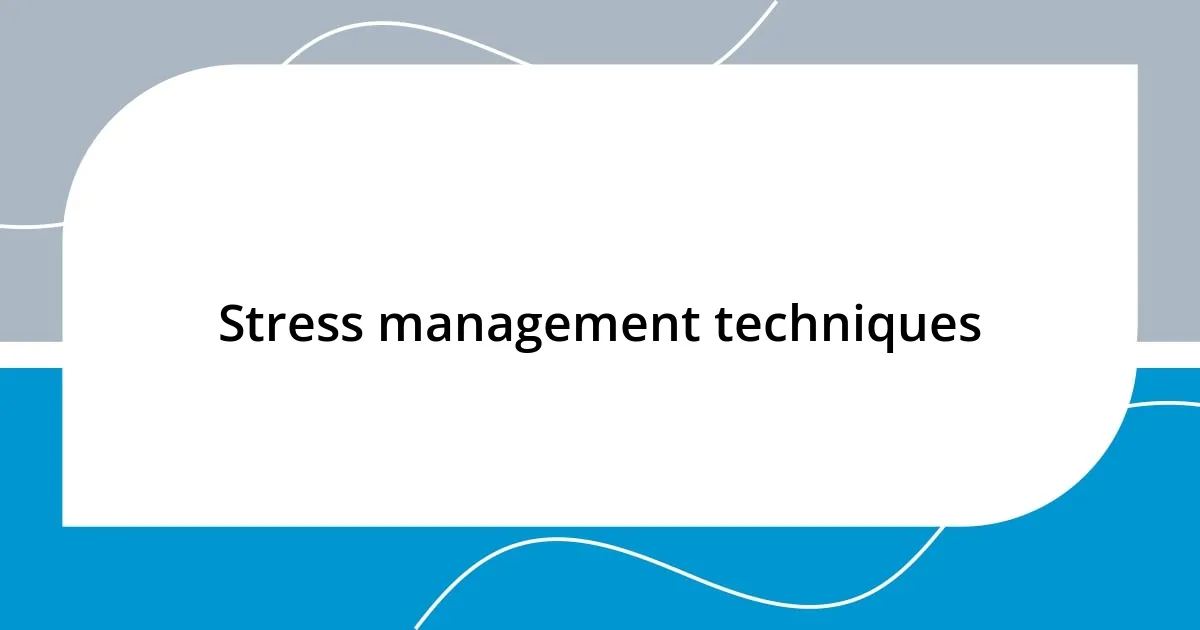
Stress management techniques
Stress has a sneaky way of creeping into our lives, doesn’t it? One of my go-to techniques for managing stress is deep breathing. I remember sitting at my desk, feeling overwhelmed with deadlines. I took a minute to close my eyes and focus on my breath, inhaling slowly through my nose and exhaling through my mouth. Each breath felt like a wave washing over me, gently easing that tight knot in my chest. It’s remarkable how such a simple practice can ground me and bring clarity amidst chaos.
Another approach I’ve found effective is setting boundaries. There was a time when I said “yes” to everything, thinking I could handle it all. But I soon learned that overcommitting only led to burnout. Now, when I feel my plate getting too full, I pause and evaluate what truly matters. Saying “no” can be liberating! It’s about prioritizing my mental space and ensuring I have the energy to tackle what’s genuinely important. You might find it relieving to carve out that personal time, too.
I also incorporate mindfulness into my daily routine. At the end of a hectic day, I take a few moments to reflect on what went well and what I’m grateful for. This practice not only helps me unwind but also shifts my focus away from stressors. Have you ever noticed how gratitude can change your mindset? By embracing this reflective moment, I feel more in control and less frazzled, which directly impacts my energy levels.
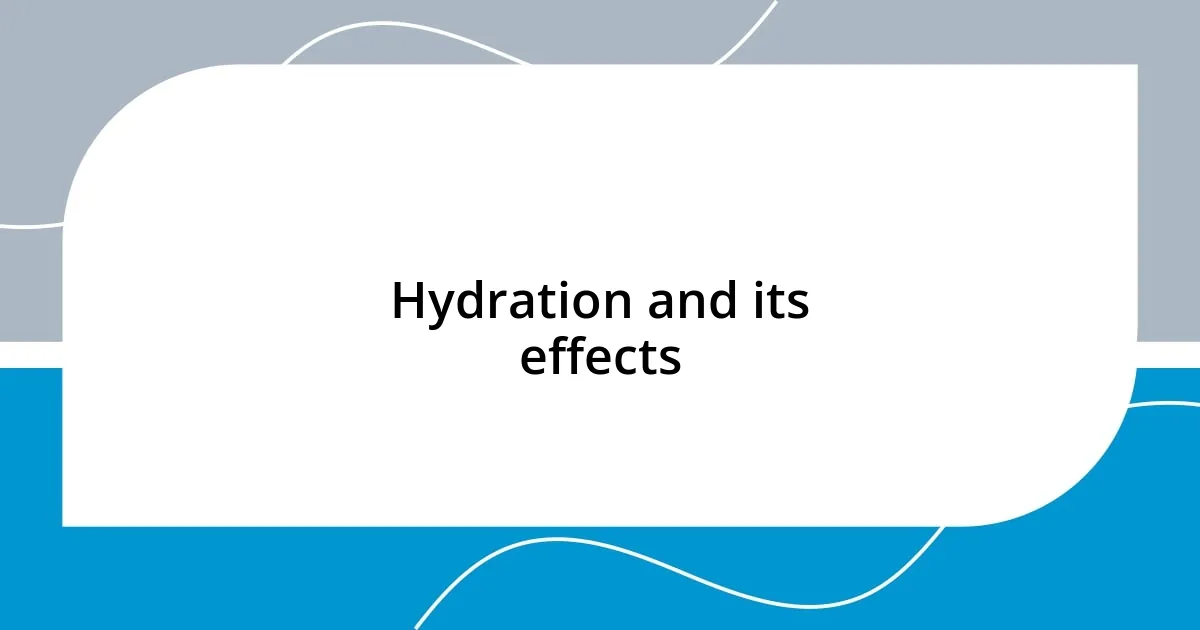
Hydration and its effects
Hydration is something I’ve come to appreciate more and more over the years. I used to think that thirst was just a normal part of the day, but I soon realized how crucial water was for my energy levels. There have been countless times during long afternoons when I felt sluggish, only to discover that a glass of water instantly rejuvenated me. Have you ever experienced that sudden lift just by staying hydrated?
When I really pay attention to my water intake, I notice a significant decrease in that heavy fatigue that sometimes lingers throughout my day. I remember one particularly busy week when I got caught up in back-to-back meetings. I neglected my hydration, and by midweek, my energy plummeted. It wasn’t until I made a conscious effort to keep my water bottle at my side that I felt more alert and engaged. It’s fascinating how a simple habit can make such a difference, don’t you think?
Keeping hydrated isn’t just about drinking water; it also involves mindful choices about the fluids I consume. After a workout session, I often opt for coconut water or herbal teas to replenish electrolytes and stay refreshed. I find that these alternatives not only hydrate but also offer a variety of flavors that keep things interesting. It’s a small change that adds a pinch of enjoyment to my hydration routine, and I’m curious if you’ve tried exploring different healthy drinks as well!
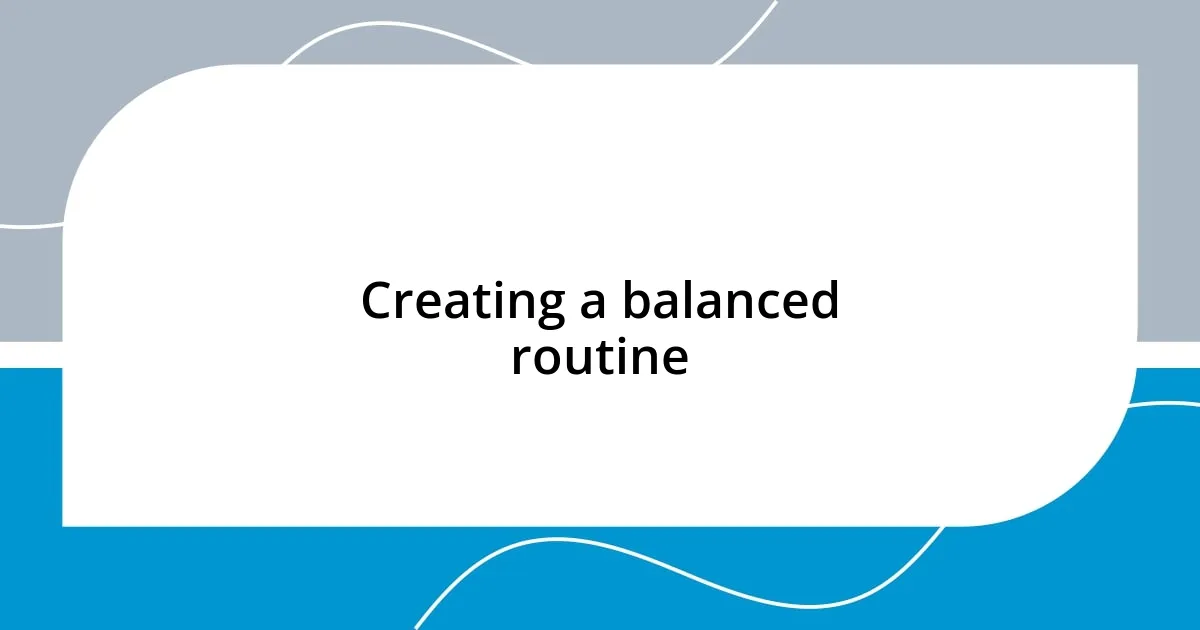
Creating a balanced routine
Creating a balanced routine is something I’ve discovered to be essential for managing my fatigue. I remember during a particularly hectic phase, I completely lost track of time. My days would blend into nights, leaving me drained and irritable. That was my wake-up call to structure my days more harmoniously. Implementing specific time blocks for work, exercise, and relaxation helped me reclaim my energy and focus. Have you ever felt like you’re juggling too many balls? Finding that sweet spot for balance can make all the difference.
I often reflect on how my mornings set the tone for the rest of my day. Establishing a consistent wake-up time, even on weekends, has created a rhythm that my body loves. I wake up, stretch a bit, and have a healthy breakfast — it feels like a warm-up for the day ahead. Skipping this has left me feeling sluggish and unmotivated. Isn’t it amazing how something so simple can impact our energy levels so profoundly? I’ve learned that cultivating a morning routine I genuinely enjoy sets a positive mood and keeps stress at bay.
In addition to structure, I’ve found that listening to my body is crucial. There are days I can power through a heavy workout, and then there are days when rest feels like the best option. One rainy afternoon, I chose to curl up with a book instead of hitting the gym, and surprisingly, I felt more energized the next day. How often do we overlook our body’s signals? Embracing both activity and rest as parts of my balanced routine has taught me to honor what my body truly needs, creating a cycle where I’m both productive and well-rested.











